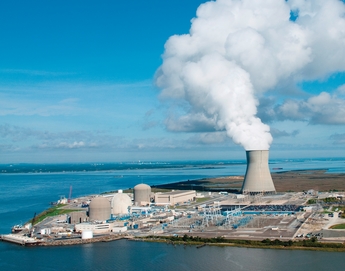 The US state of New Jersey on 12 April passed legislation to prevent the premature closure its Hope Creek and Salem nuclear power plants. Public Service Enterprise Group (PSEG), which operates Hope Creek and Salem, had said earlier that without intervention the plants would not be able to continue covering their costs within two years. In March, PSEG, together with Salem's co-owner Exelon, suspended funding for future capital projects at the site because of the delays to the passage of the legislation.
The US state of New Jersey on 12 April passed legislation to prevent the premature closure its Hope Creek and Salem nuclear power plants. Public Service Enterprise Group (PSEG), which operates Hope Creek and Salem, had said earlier that without intervention the plants would not be able to continue covering their costs within two years. In March, PSEG, together with Salem's co-owner Exelon, suspended funding for future capital projects at the site because of the delays to the passage of the legislation.
The legislation comprises a clean energy package, which included three separate energy bills targeted at nuclear energy, renewables and a wind energy pilot programme. The nuclear bills establish a zero-emission credit (ZEC) programme that compensates nuclear plants for carbon-free electricity production. However, for nuclear plants to receive the $11 per megawatt-hour (MWh) subsidy they needed to keep operating, Governor Philip Murphy, anti-nuclear groups and companies that install solar panels demanded $210/MWh to $304/MWh for solar energy.
To be eligible for the subsidy a plant must be licensed to operate until 2030 or later. Exelon's Oyster Creek, which is due to close this October will not be eligible for the ZEC programme, which will be funded by a tariff imposed on retail distribution customers. The New Jersey Office of Legislative Services (OLS) estimates that the tax is likely to generate a revenue of up to $301m. The Salem and Hope Creek plants are expected to receive about $253m in revenue from ZEC sales to electric public utilities. Unlike other state subsidies for nuclear, the New Jersey legislation sets no time limit for operation, although the subsidy must be re-valued by the state’s regulatory commission every three years.
Legislation allowing nuclear plants to continue operating in Illinois in 2016 also resulted in more subsidies for solar, but at a much lower rate. In Illinois, solar receives five times more per megawatt-hour ($50/MWh) than its two subsidised nuclear stations ($10/MWh). In a speech to Wall Street analysts, Nuclear Energy Institute president Maria Korsnick warned against “a myopic focus on short-term prices“ and criticised efforts “that advance renewables while closing nuclear plants. Korsnick warned that the seven operating nuclear plants in Ohio and Pennsylvania would be replaced by coal or natural gas if state legislatures fail to follow the lead of New York, Illinois, Connecticut and New Jersey. New York and Illinois instituted ZEC programmes in 2016 and Connecticut adopted legislation in 2017 allowing Millstone to compete with other non-emitting sources in a clean electricity procurement.
Photo: The Salem and Hope Creek nuclear plants






